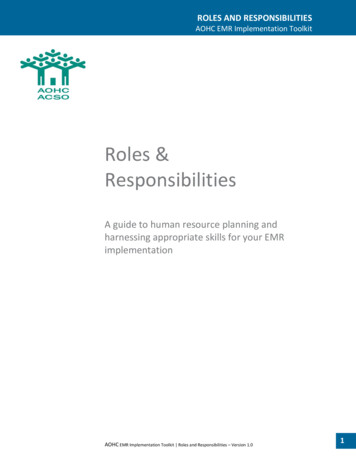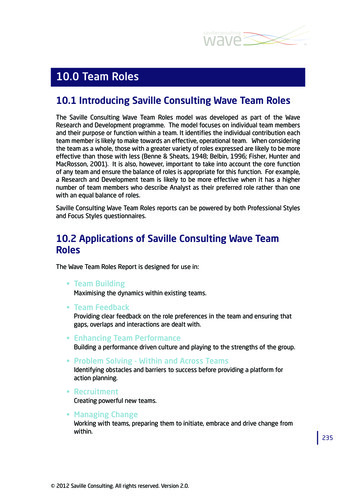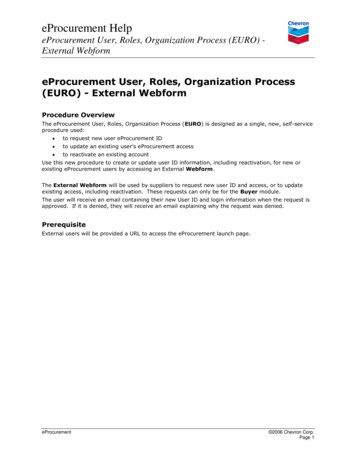
Transcription
The Roles of Values and Advocacy Approaches in IrishSocial Work Practice: Findings From an AttitudinalSurvey of Practicing Social WorkersJoe Whelan, Ph.D.School of Applied Social StudiesUniversity College Corkjoseph.whelan@ucc.ieJournal of Social Work Values and Ethics, Volume 17, Number 2 (2020)Copyright 2020, ASWBThis text may be freely shared among individuals, but it may not be republished in any medium withoutexpress written consent from the authors and advance notification of ASWB.AbstractThis paper focuses on the profession of social workin Ireland. It examines the role of values within theprofession and the relationship of the profession toindependent advocacy groups, exploring themesof fundamental importance to social work. Thefindings presented are drawn from a quantitativeattitudinal survey of practicing social workersconducted in the Republic of Ireland in 2016.Sampling was conducted across Ireland within apopulation of approximately 3900 practising socialworkers and resulted in 128 responses, 111 ofwhich were complete. In relation to values, overallfindings suggest a preference for traditional valuetypes, with many respondents indicating that thetasks associated with emancipatory values are bestplaced with other groups in Irish society. In relationto advocacy, the study found that social workersfrequently engage in advocacy tasks. However,despite this, it also found that a majority of socialworkers feel that such tasks are best placed withother groups in Irish society. The study found thata majority of social workers acknowledge a sharedvalue-base with independent advocacy groups.However, it also suggests that the relationshipbetween social workers and advocacy groups iscomplex and conflictual. While social workersrecognize the importance of advocacy groups, theyalso acknowledge that advocacy groups do notalways complement the social work role. Ultimatelythis study suggests that to many practitioners,the necessity for advocacy groups in Ireland canbe ascribed, in part at least, to the ways in whichcontemporary social work practice is carried out.Keywords: social work; values and ethics, advocacy;independent advocacy groups; Ireland.A Common Base: Values andEthics in Social WorkSocial work values can be viewed asthe discourse through which the structure of theprofession is maintained, justified, and transmitted,latterly becoming codified and legitimised throughformal codes of ethics (Spano & Koenig, 2007).Thompson (2009) defines a value as “somethingwe hold dear, something we see as important andworthy of safeguarding” (p. 126), with Banks(1995) describing social work codes of ethicsas “The fundamental moral/ethical principles ofsocial work” (p. 04; see also BASW, 2014; IASW,2006 for precise examples). These definitionsare succinct but their aptness is debatable. Inreality, social work values and ethics are abstractand contested concepts and therefore extremelydifficult to adequately and satisfactorily define(Banks, 1995; Shardlow, 2002a; Dominelli, 2002).However, along with knowledge and skills, valuesand ethics are central pillars of the profession and,as such, a heavy feature of generic social workJournal of Social Work Values & Ethics, Fall 2020, Vol. 17, No. 2 - page 39
The Roles of Values and Advocacy Approaches in Irish Social Work Practice: Findings From an Attitudinal Survey of Practicing Social Workerstextbooks (Banks, 1995; Shardlow, 2002b; 2009;Beckett & Maynard, 2005; Reamer, 2006; Higham,2006; Thompson, 2009; Wilson et al., 2008).In terms of the development of contemporaryvalues and ethics discourse, Reamer (1980; 1983;1994; 1998; 2006; 2014; 2015), writing in theUnited States, has published extensively in the areaand provides a useful model for analysis. He hasidentified four distinct periods through which thegenealogy of contemporary social work values andethics can be traced. It is important to point out thatthese periods do not denote a linear progressionand often overlap, occurring at different times indifferent jurisdictions. They are detailed as follows:1. The morality period;2. The values period;3. The ethics theory and decision makingperiod;4. The ethical standards and riskmanagement period.The “morality period” refers to the late 20thcentury and posits that social workers were moreconcerned with the morality of the client rather thanwith what may have contributed to their need forintervention. This analysis is largely congruent withthe Irish example where social work developed inthe moral atmosphere of charitable interventioncouched in the language of Catholic socialteaching (Curry, 1998; Cousins, 2003; Considine& Dukelow, 2009). To further highlight the linkbetween social work values and religious morality,it is interesting to note that Biestek (1961), himselfa Catholic priest, is credited with developing whathas subsequently been identified as the traditionalsocial work value-base in his foundational workThe Case-Work Relationship. In this work, Biestek(1961) developed seven principles of social work.Because of their ongoing importance to social workthey are listed as follows: Individualization,Self-determination,Purposeful expression of feelings,Controlled emotional involvement,Acceptance, Confidentially,Non-judgemental attitude.The values espoused by Biestek (1961),while highly individual in nature, remain hugelyrelevant in social work today.The period in which Biestek was writingencapsulates what Reamer (1998) referred to asthe “values period” and was marked by a focuson developing specific social work values. Furthernotable contributions from the values period comefrom Levy (1972; 1973) who attempted to developa typology of social work values and subsequentlywent on to help create and develop social workcodes of ethics (Chase, 2015). Following this,but preceding Reamer’s (1998) third period, wesee the development of what have come to beknown as emancipatory values (Highman, 2006;Thompson, 2009). These values differ extensivelyfrom traditional social work values in that theirfocus was much more on matters of social justiceand structural inequalities (Highman, 2006;Thompson, 2009). Much of the emancipatorymovement in social work originated in the US andwas perhaps reflective of the turbulence of a periodso characterized by struggles for social and civilrights (Reamer, 1998). Academics and practitionersespousing emancipatory values were openly anddirectly critical of traditional casework approaches(Chase, 2015; Reamer, 1998). Notable entries fromthis time include Emmet (1962), Lucas (1963),Plant (1970) and Lewis (1972).Reamer’s (1998) third period is referred toas the “ethics theory and decision making period”and is characterised by a renewed focus on appliedprofessional ethics. This period can be viewed asreflective of developments in the field of medicalethics. This period led directly to the fourth period,the “ethical standards and risk management period,”which is arguably most reflective of contemporarysocial work in Ireland today. It is the period of thesocial worker as the “bureau professional” (Parry& Parry, 1979) who works within a hierarchicalstructure where ethics and values represent a codefor practice, a guide for conduct, and a template fordecision making (Spano & Koenig, 2007; Chase;Journal of Social Work Values & Ethics, Fall 2020, Vol. 17, No. 2 - page 40
The Roles of Values and Advocacy Approaches in Irish Social Work Practice: Findings From an Attitudinal Survey of Practicing Social Workers2015; Banks, 2013; Reamer, 1998). While thediscourse of values remains largely intact, locatedwithin these codes of ethics, it is uncertain howreflective this discourse is of actual practice.An Irish Code of Ethics: CompetingForces in the Ethics SpaceWhen it comes to formal codes of ethicsin a contemporary Irish context, social workershave traditionally turned to the Irish Association ofSocial Workers (IASW) for guidance. The IASW isthe professional organization for social workers inIreland, having been founded in 1971. Membershipin the IASW is not compulsory, and members areexpected to pay a nominal fee in order to join. Theorganization currently has approximately 1300active members (IASW, 2019). The IASW is alsoa member of the International Federation of SocialWorkers (IFSW) and in terms of the articulationof values and ethics, it is from the IFSW that theIASW draws its own guidance and mandate. In thefirst instance, the IASW adopts global definitionof social work as approved by the IFSW GeneralMeeting and the IASSW (International Associationof Schools of Social Work) General Assemblyin July 2014. The IASW also promotes a valuesstatement and professional code of ethics whichgreatly mirror those of the IFSW while also adheringto that body’s own “Statement of Ethical Principlesand Professional Integrity.” More recently, and inrecognition of the somewhat abstract and, arguably,difficult nature of ethical statements in the contextof actual practice, the IASW has issued a codeof practice for its members (IASW, 2009). Thisconsists of separate lists of concise statements inthe form of “members will ” and “members willnot ”.With respect to its code of ethics, whilethe IASW (2006) states that it expects that “socialworkers will use this Code of Ethics as a foundationon which to frame procedures guiding day-to-daypractice” (p. 02), it must be noted that the code towhich this direction pertains has no legal basis orstatutory footing. Furthermore, it is difficult to seehow this would or could apply to non-memberswho appear to be the majority of practicing socialworkers in the Republic of Ireland. In terms of alegislative basis for social work values and ethics,it is the Health and Social Care Professionals Actof 2005 that functions to formalize this space in alegal-rational context. More recently, in 2012, theAct was amended, which led to the establishmentof CORU, a regulatory body which includesHealth and Social Care Professionals Counciland the Registration Boards established under theHealth and Social Care Professionals Act 2005 (asamended). The stated role of CORU is to: Set the standards that health and socialcare professionals must meetEnsure that the relevant educationalbodies deliver qualifications thatprepare professionals to provide safeand appropriate careMaintain and publish a register ofhealth and social care professionalswho meet established standardsEnsure that registered professionalskeep their skills up to date by promotingcontinuing professional developmentRun Fitness to Practice hearingsinto the conduct and competence ofregistrantsFundamentally, CORU retains the primaryrole in governing the profession of social work inIreland. In the context of values and ethics, CORU(2011) has its own Code of Professional Conductand Ethics for Social Workers in the Republic ofIreland, which, while not necessarily incongruentwith the previously mentioned IASW code, isnevertheless, entirely separate from that entity’sarticulation of values and ethics. It also very muchrepresents the formal legal basis on which socialwork in Ireland is expected to be carried out. Interms of a value position, CORU (2011), lists thefollowing values as paramount:Journal of Social Work Values & Ethics, Fall 2020, Vol. 17, No. 2 - page 41 Respect for the inherent dignity andworth of persons;Pursuit of social justice;Integrity of professional practice;
The Roles of Values and Advocacy Approaches in Irish Social Work Practice: Findings From an Attitudinal Survey of Practicing Social Workers Confidentiality in professionalpractice;Competence in professional practice.(p. 04)It then goes on to list the particular duties ofpracticing social workers, before expanding on thevalue statements given above.A close reading of these value positionsdenotes an overt emphasis on the responsiblizationof social workers, particularly in the areas of legalawareness, extensive record-keeping, and continuingprofessional development. These are arguablyless prominent in the codes of ethics articulatedby the IASW and others. What is also writ largeacross the CORU code of ethics, both implicitlyand explicitly, is the continuous reiteration of theconsequences for non-compliance. Social workersare effectively told that in order to meet the basis forlegitimate practice, they must read and understandthe code. Failure to do so, they are told, could resultin a “complaint of professional misconduct” whichthe code defines as “any act, omission or pattern ofconduct of the registrant which is a breach of thecode” (CORU, 2011, p.03). This clearly denotes themore formal level of governance that the CORUcode of ethics implies.The advent of CORU and the implementationof a formal code of ethics as a tool of governancehas arguably pushed the profession of social workinto a new space in the Republic of Ireland. Thisnew form of regulation and governance has not yethad sufficient time to bed-in and, resultantly, it isdifficult assess the overall impact of CORU and theCORU code of ethics in the context of Irish socialwork practice. It is also difficult to assess whereless formal codes of ethics, such as those given bythe IASW, sit in relation to codes which exist on astatutory footing. While they may not necessarilybe incongruent with one another and social workerscould, in that sense, be reasonably expected toobserve both, there is no doubt that the code ofethics as given by CORU ultimately articulatesthe standard at which Irish social work should andindeed must be practiced. Whether or not Irishsocial workers have caught up to this new paradigmof governance is a question we will return to in thedata summary that follows.Delivering a Discourse: Values inSocial Work EducationImparting a strong and robust discoursedenoting social work as a value-led professionmust almost certainly form part of any social workeducative curriculum (Hugman, 2005; Mackay& Woodward, 2010). Hugman & Smith (1995)echo this sentiment and argue that the teachingand imparting of the profession’s value-base isthe single most important aspect of training newsocial workers. However, such a task is not withoutchallenge and this is reflected in the literature.Clifford & Burke (2009) argue that methodsrelating to the teaching of social work valuesremain underdeveloped. Allen & Friedman (2010)acknowledge the essentialness of imparting socialwork values to students but argue that a difficultyarises from the fact that the take-up of these valuesis incredibly difficult to assess.Valutis, Ruben, & Bell (2012), usingErikson’s stage model as a template, argue that whenwe teach is as important as what we teach and thatdifferent students will learn and internalize valuebeliefs more thoroughly at different stages of theirtraining. They further argue that age is closely relatedto self-awareness and identity development and thatthis has an effect on professional socialization andthe ability and readiness of students to take on newvalue systems and beliefs. Perhaps compoundingthe difficulties in imparting social work values tostudents is the question of the types of students beingrecruited. Gustavsson & MacEachron (2014) assertthat there is huge external and economic pressure onsocial work schools to abandon restrictive ethicalgatekeeping in student recruitment policies. Despitesuch difficulties, the fact remains that values andethics are core to the social work profession, andthis must be reflected in the education of new socialworkers.It is possible that there are competingvalues discourses in social work education andthat this is reflective of the conflicted nature of theJournal of Social Work Values & Ethics, Fall 2020, Vol. 17, No. 2 - page 42
The Roles of Values and Advocacy Approaches in Irish Social Work Practice: Findings From an Attitudinal Survey of Practicing Social Workersprofession in general. The literature consistentlyhighlights the divide that exists between thesecompeting discourses in the form of traditionaland emancipatory values. Mackay & Woodward(2010), writing in Scotland, have recognized this.They highlight the influence of market-driven,neoliberal ideologies and managerialism in theformation of social work curricula which, theyargue, is reflective of governmental influence onmodern social work codes of ethics. They furtherargue that students consistently do not recognizethe more structural components of the social workvalue-base. Furthermore, they suggest that studentsare often preoccupied with individual approachesto values at the expense of structural analysis andcritical reflection. This is a point that they are notalone in making; Price & Simpson (2007) havepreviously argued that social work educationneeds to reclaim sociology in order to best meetthe needs of the most disadvantaged. In a moregeneral sense these arguments have clear parallelswith Ferguson’s (2008) call to reclaim social workby challenging the neoliberal agenda through thepursuit of social justice. This all clearly implies theimportance of emancipatory values in social workand their continuing importance in social workeducation. In a follow-up piece concerning the samethemes, Mackay & Woodward (2012) conducteda small-scale research project where 22 studentsocial workers answered a qualitative questionnairerelating to values. The results showed that forstudents, values often remain abstract. Studentswere also found to have difficulty articulatingemancipatory values and many struggled to sayhow they would apply such values in practice. Sayre& Sar (2015) have argued that social justice is aprimary value in social work and that this should bereflected not only in what is taught but in how it istaught, particularly where students themselves maybe facing inequality and oppression. In this respect,they argue that by modelling values that promotesocial justice, instructors may also impart thosevalues to students accordingly.There can be no doubt about the importanceof social work values in all aspects of the educationprocess. However, values themselves are clearlyconflicted and this is reflective of the conflictednature of the profession itself. Individual values areimportant but are also arguably consistent with theneoliberal agenda which promotes social work as aform of governmentality or as a vehicle for socialcontrol as part of a “Bismarckian”-style welfare state(Philp, 1979; Bryson, 1992). Emancipatory values,located in radical approaches, sought to challengeindividualistic approaches at the time of theirinception and, arguably, remain suitable for doing sonow (Fook, 1993; Ferguson, 2008). The process ofmaintaining and implementing a strong and robustvalue-framework, which is inclusive of all socialwork values, must necessarily begin in social workeducation (Mackay & Woodward, 2010).Incongruent Discourses: Personal,professional and organizational valuesSocial work does not take place in a societalvacuum. Social workers come to practice withtheir own biographies and, despite the socializingeffects of the educative process, their own valuesand belief systems (Abbott, 1988; Landau, 1999;Reamer, 2001; Vanderwoerd, 2002; Cree, 2003;Allen & Friedman, 2010; Chechak, 2015). Ofcourse lived experience can be both powerfuland advantageous and may in fact lend beneficialinsight to practitioners (Christie & Weeks, 1998).Conversely, an over-reliance on lived experienceas a form of practical knowledge may prove tobe a barrier to practitioners who find themselvesimplementing professional values at the expenseof personal ones (Gough & Spencer, 2014). In theliterature, this phenomenon is referred to as valueincongruence (Constable, 1983; Spano & Koenig,2007; Stewart, 2009; Chechak, 2015). This conflict,or incongruence, naturally leads to the question ofhow influential personal values are in social workpractice. Gough & Spencer (2014), writing inCanada, carried out a study which targeted 1800registered social workers by way of a questionnaire.Of this group, 300 social workers completedJournal of Social Work Values & Ethics, Fall 2020, Vol. 17, No. 2 - page 43
The Roles of Values and Advocacy Approaches in Irish Social Work Practice: Findings From an Attitudinal Survey of Practicing Social Workersresponses. From these results the researchers wereable to show that personal values ranked very highlyin the order of importance in social workers’ dayto-day practice and in fact ranked higher than theCanadian Association of Social Workers’ code ofethics. This is a very real concern for a professionthat purports to operate within a strict code of ethicsthat, ideally, allows no place for personal values toinfluence professional decision making.However, this is not the only value conflictapparent in contemporary social work practice.Professional social work values and ethics can alsoconflict with organizational values and standardoperating procedures. The Gough & Spencer (2014)study also addressed the issue of value clashes,finding that 82% of respondents reported incidencesof conflicts between their individual person valuesand those of their employing organization. In anearlier study, Levin & Weiss-Gal (2009), writingin Israel, undertook a quantitative content analysisof social work job descriptions to ascertain howmuch emphasis was placed on the use of socialwork values. The findings assert that agencies areeither not at all or, at best, only partially interestedin value-led participatory approaches with serviceusers. Banks (2002; 2013) further encapsulated thisargument by highlighting the conflict that existsbetween personal engagement and professionalaccountability in social work practice. Personalengagement, she argues, is value-led and ischaracterized by challenging structural oppressionthrough critical practice. It reflects the discourseof emancipatory values in practice. Professionalaccountability, she argues, is concerned withstandards, justifying decision making, effectiveness,and efficiencies. It reflects the neoliberal politicalatmosphere in which contemporary social workis constructed and carried out, and it is embeddedwithin the paradigm of managerialism. Thesearguments are generally reflective of the work ofauthors such as Ferguson (2004; 2008) and Harlowet al. (2013) and speak to the general conflictednature of social work.The Development of the AdvocacyDiscourse in Social WorkThe roots of contemporary advocacy asa practice are to be found particularly in the legalfield. Here advocacy is concerned with the processesthat lawyers or solicitors engage in on behalf oftheir clients (Wilks, 2012). Social work-orientatedempowerment and advocacy, with an emphasis onachieving social objectives, arguably stems from1980’s and 90’s practice approaches (Payne, 1997).However, it can be argued that advocacy has alwaysbeen implicit within social work; some authorsargue that social workers have long been leaders ofreform, advocates for social justice, and championsof the many issues facing vulnerable populations(Brawley, 1997; Talbot & McMillin, 2014; Bliss,2015). It is perhaps useful to separate advocacyas it relates to social objectives from other formsof advocacy. “Social advocacy” is almost alwaysconcerned with helping disempowered cohorts torealize rights, and in this way it represents an avenuefor empowerment. Leadbetter (2002) helps to definethis position by stating that “Empowerment andadvocacy are both concerned with a shift of poweror emphasis towards meeting the needs and rightsof people who otherwise would be marginalizedor oppressed” (p. 201). The values inherent inadvocacy and empowerment approaches are thosethat can be characterised as emancipatory and itcan be suggested that rights work, empowermentapproaches, and advocacy can be viewed asinseparable or interchangeable. Dalrymple (2004)has also made the distinction between two typesor levels of advocacy, both of which may be thedomain of social workers depending on the context.They are interpreted here as follows:Journal of Social Work Values & Ethics, Fall 2020, Vol. 17, No. 2 - page 441. Case level advocacy, which isconcerned with working at the levelof the individual to help them realizegoals, achieve objectives, or exercisetheir individual rights;2. Structural level advocacy, which isconcerned with advocating for changesat a societal level around matters thatmay be affecting whole cohorts of agiven population.
The Roles of Values and Advocacy Approaches in Irish Social Work Practice: Findings From an Attitudinal Survey of Practicing Social WorkersWhile there can be no doubt then thatadvocacy work, whether implicit or explicitlynamed as such, is deeply embedded in the socialwork role, it does not represent a social workpanacea, and such approaches can be potentiallyproblematic. Payne (1997) has argued that closelyrelated to empowerment and advocacy is theconcept of management theory located withina political ideology that emphasizes motivatingindividuals to take responsibility for meetingtheir own needs. This point has been echoed inthe literature by those who champion service userparticipation and empowerment but who also realizethe potential for such concepts to be degraded toa rationale for the state to provide fewer servicesand resources to those who actually need them(Beresford, 1991; 2001; Beresford & Croft, 1993;Wright, 2012). Furthermore, Hardwick (2014)has noted that stakeholders, in the form of stateprovided social work services, have shown a recentand increasing interest in independent advocacygroups, which they view as a useful resource intimes of limited resources. There is a danger thenthat discourses of advocacy and empowermentcan and are being hijacked or manipulated bythose with vested interests in preserving stateresources. This is perhaps best encapsulated withinthe wider paradigm of welfare devolution (Sheely,2012; Bifulco, 2013; Chaney & Wincott, 2014).Advocacy and empowerment approaches canpotentially be viewed as the moderate radical inthe family of emancipatory approaches—perhapsthe less troublesome, less unkempt, and slightlymore acceptable first cousin to more radical antioppressive practice approaches and the discoursesthey represent.Competing Discourses: Advocacyin Social Work or Advocacy versusSocial Work?Brydon (2010), writing in Australia andexamining social work advocacy in Singapore,argues that social work is delivered in sociopoliticalcontexts that allow for varying degrees of toleranceto advocacy approaches and that advocacy, asa function of social work, is constructed andconstrained by the context in which the practitioneris working. Of course, Dalrymple (2004) haspreviously distinguished between advocacy carriedout at a case level and that carried out at a structurallevel. The type of advocacy being carried out thenis, arguably, reflective of the context and constraintswhich Brydon (2010) alludes to. There is no doubtthat advocacy work, at whatever level it occurs,does take place in social work settings. In thisrespect, Brydon (2010) argues that advocacy mustnecessarily entail collaboration between practitionerand client. This again speaks to the emancipatorynature of advocacy work. Hardwick (2014) makes asimilar point by illustrating clear parallels betweenthe purposes of advocacy and the social workvalue-base. However, for Hardwick (2014) this iswhere the parallels cease. Hardwick’s (2014) studyhas highlighted the distinction between social workand independent advocacy groups by evaluating acity-wide advocacy hub in the north of England.She notes that the peripheral nature of advocacy insocial work is contrary to the profession’s espousedprinciples and values, and argues that social work isfast becoming a resources-led rather than a needsled activity, with social workers acting as bureauprofessional labourers cloaked under the thin veilof managerialism. One result of this, along withcurrent policy trends and the inability of statutorysocial work to adequately respond to people’sneeds, is a movement of service users towardsindependent advocacy groups (Hardwick, 2014).Barnes (2012), in a study conducted in the UnitedKingdom concerning young people’s rights, echoesthis point and argues that while social workers doindeed share many common value positions withrights advocates or advocacy workers, advocacyworkers operate more closely in line with an ethicof care while social workers are more concernedwith management. Furthermore, her studyshowed that rights workers often find themselvescompensating for the limitations of the social workprocess through simple but effective methods suchas being available by phone or ringing to check inwith clients to see how they are doing.Journal of Social Work Values & Ethics, Fall 2020, Vol. 17, No. 2 - page 45
The Roles of Values and Advocacy Approaches in Irish Social Work Practice: Findings From an Attitudinal Survey of Practicing Social WorkersIt is clear then that advocacy andempowerment work is not the sole preserve ofthe social work profession and indeed the adventof independent advocacy groups along with statesponsored advocacy initiatives means that both areclearly working in the same space. Furthermore, itcan be argued that for each social work client groupthere is a related advocacy group or groups. Thiscan be clearly and easily demonstrated in the Irishcontext as shown Figure 1 below.Many of the client groups shown abovehave more than one related advocacy group. It isgroups. The Irish Health Service Executive (HSE)also staffs a dedicated advocacy unit to help citizensnavigate the health system here, and the CitizensInformation Service (CIS) provides a free advocacyservice available to all citizens on virtually all issuesrequiring advocacy.Having now examined the debates aroundadvocacy as it relates to social work, we see acorrelation emerging between the two. There is alink between how contemporary Irish social workpractice is constructed and carried out and theformation of and necessity for advocacy groups.worth exploring why this is the case. I
Journal of Social Work Values & Ethics, Fall 2020, Vol. 17, No. 2 - page 41 The Roles of Values and Advocacy Approaches in Irish Social Work Practice: Findings From an Attitudinal Survey of Practicing Social Workers 2015; Banks, 2013; Reamer, 1998). While the discourse of values remains largely intact, located










